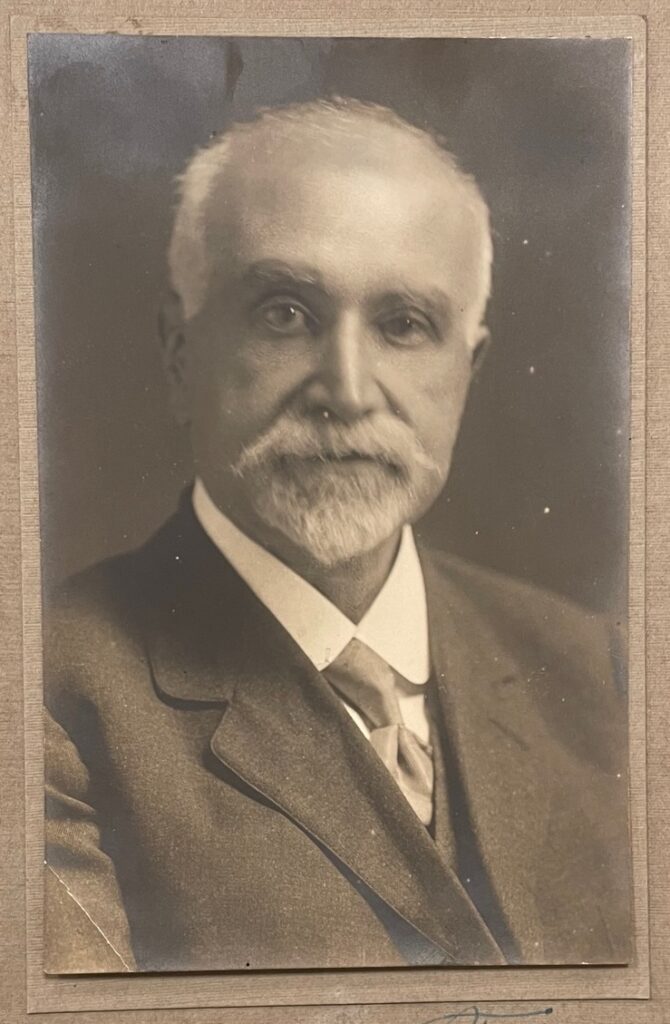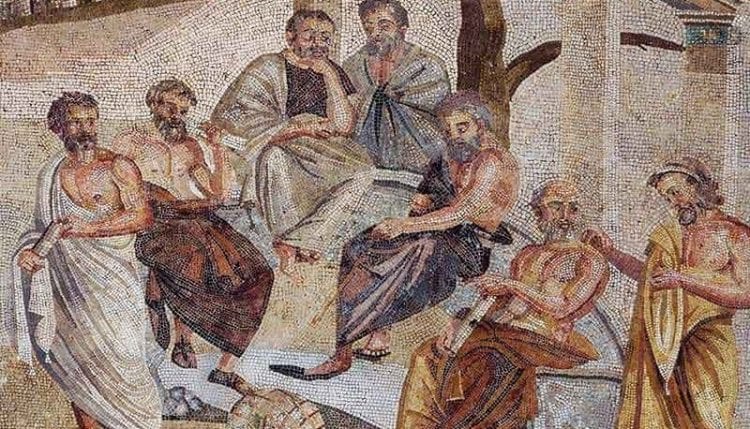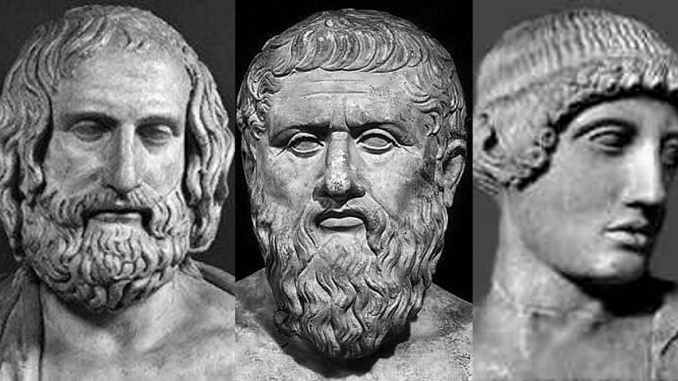The Sophists
Lecture Notes of James Haughton Wood
1929


Sophists

§ The sophists stand as the champions of humanism and individualism against traditionalism and authority.
§ Ths temper they express is one they did not create. And their whole weight thrown against would not have prevented its appearance.
It has other expressions as well, e. g. the plays of Euripides.
But the Sophists rationalized it.
§ On its negative side, it appears merely as a skepticism and a criticism of institutions and attitudes which needed only to be brought in question to be overthrown
§ On its positive side, this humanism is rationalized in the Protagorean theory of knowledge.
Knowledge is perception.
The accepted theory of perception is the emanation theory of Empedocles and the Atomists.
The content of perception is relative to the perceiving sense-organ and perceiving mind.
So far as there are individual difference in this respect, there is an irreducible diversity of individual apprehension.
§ Further, as the argument of Gorgias emphasizes, the situation of the perceiver is one which shuts him off from any supposedly independent and objective reality. What is real for him can only be the world of his perceptions, apprehensions.
§ With respect to truth, this means that truth is always relative to humanity – further that for the individual there is and can be only such truth as he recognizes.
§ In the field of morals, this means that what is good and right is equally relative. Instead of being objective, immutable, ordained of the gods, handed down from our forefathers, it is only that which here and now justifies itself to our individual apprehension.
§ The individual is his own ultimate standard, and upon this no external authority can validly be imposed.
§ It is no wonder that the conservatives viewed this temper as likely to wreck civilization and reduce an orderly social world to chaos.
§ In the first place, we must point out. the sense in which this attitude is profoundly right.
To be a rational being, the individual must hold his own reason the final bar of such judgment of truth and right as is possible to him.
If he admits authority, it is his judgment which makes the admission.
§ In the field of action, the individual must be responsible for himself and to himself.
No external authority can transcend his own moral sense. Whatever risks are involved in making his own decisions are risks which he inevitably takes.
§ Of a period which repeated many of the characteristics of this one at a late age, the philosopher Kant said,
“It is man’s coming of age. Sapere aude – “Dare to use thine own reason.”
§ In a sense this is the spirit of progress – thought freed from the swaddling clothes of tradition; thought which is free.
§ But in making this great advance, the Sophists and the age for which they stood had confounded liberty with licence, freedom and libertinism; truth which is always relative to man with the chance opinions and perceptions of individuals.
§ Turn to the theory of Protagoras. It makes truth consist of perception, which differs with individuals.
S If this is so, then there is no such thing as truth.. There are only individual opinions, and one is as.good as another.
§ This view cuts the ground from under its own feet.
The reductio ad absurdum.
§ But the Sophists would deny the implication that one opinion is as good as another.
In rehabilitating their argument, they claim that good and bad are – for opinions, at any rate – objective.
But they cannot consistently maintain this. For a judgment of truth they merely substitute a judgment of values. But values are relative in the same sense that truth is.
§ So that in the end this view would simply abolish truth and right and good, and we should be swamped in a welter of individual opinions. Which is, to a degree, just what happened to the culture of Athens at this period.
§ This Sophistic philosophy thus poses a dilemma; there can be no authority, such as tradition, which must not submit to be brought to the bar of the individual’s judgment.
Any other course would be to stop the wheels of progress. But if truth and right are merely individual, then they do not exist.
Outside the individual there is no final authority, but if there is no authority, we are lost.
§ It is the significance of the Socratic philosophy that it points the way to the solution of this dilemma.
Beginning this week, the reading in Bakewell is such as can usefully be made the basis of conference questions and discussion. If this is done to some extent, it will have its effect in getting the students in the habit of doing the assigned reading in a proper way.
§ The Sophists had dealt the death blow to the foundation upon which all ancient civilization rested – orthodox belief in the gods who watched over and intervened in the affairs of men, who were themselves the founders and protectors of the state; belief in the inviolable sanctity of moral traditions and customs, and the supremacy of the social authority over the individual conscience.
Not that the Sophists had directly attacked these or that they would have remained firm without the Sophistic teaching, but the skeptical temper which they formulate in their theory of man as the measure of all things was incompatible with such notions. And the Sophists had nothing to offer in place of what was now destroyed – nothing but a disintegrating individualism whose highest ideal was really individual expediency.
§ Socrates holds the high place that he does in the history of thought because it was he who pointed the way out of this morass.
§ Yet Socrates agreed completely with the Sophists in repudiating the authority of tradition and in holding that all sanction for truth and justice must be found in the individual mind.
If he recognized and obeyed the law, if he upheld the authority of the state, if he was deeply pious in his attitude to the powers that be, it was not from any respect for Homer or Hesiod or any divine prerogative of law or custom, but because he found these validated by an authority which is net external but is found in the human mind itself. Socrates discovered in human reason the highest court of appeals for every judgment. That he did not follow the Sophists in their chaotic individualism is due to his discovery that human reason is not an individual but a universal thing and that this authority, while not external, to common to all. Once for all, authority and tradition were dead. The only cure for the aimlessness and confusion which followed in Athens upon this skepticism must come from some new authority. Socrates found it.
§ But the formulated teachings of Socrates are very meagre and unimportant. What he contributed was not so much a doctrine, but a new temper and a new method. What he contributed was – like many another great teacher – a life the significance of which was far more powerful than any doctrine.
§ Socrates was a man with a mission, a crank, an eccentric, a reformer. He was also one of the keenest minids that ever lived, and one of the most vigorous and intellectually unbending. Add to that, that he had a passion for conversation and argument which was marked even amongst the Greeks of his time.
§ He tells us the story of his life in the Apology.
The language is Plato’s, but we have also Zenophon’s account.
§ A man of the people, poor throughout his life, but so thoroughly absorbed in his intellectual problems that he gave up his trade of sculptor, preferring to limit his physical needs rather than give up his intellectual mission.
§ His passion was to find some answer to the riddle of life. He early gave up the attempt to find any answer to problems of cosmology. These, in any case, not man’s chief concern. The god will run the universe anyway. Man’s chief concern is with his own way of life. What is duty, what is the good way of life, how shall a man attain it.
§ Knowledge of some sort is certainly called for. But it is not the mere knowledge of tradition. Nor is it the encyclopaedic and nondescript knowledge of the Sophists.
§ Socrates assumes it is something we must all know, since we all have ideas on the subject, if we could only be clear to ourselves.
§ So he becomes a continual questions, seeking for clear ideas.
§ The kind of conversations he held we discover very clearly from Plato and Zenophon. He tried to discover from each man the conceptions he had formed of the things he knows best. He questioned poets about poetry, statesman about the art of ruling and about justice, artisans about the objects which they aimed at in their work and all men about duty and the best way of life, since that is everybody’s business.
§ He tells us about the oracle. Socrates the wisest of the Greeks.
§ Of course, the young man followed him. Some of them caught the spark of genuine interest in finding out the manner of life that makes it really worthwhile. Others undoubtedly were amused to see the dignitaries of Athena incapable of telling clearly what they ought to know best.
$ Socrates thus became the great exposer of shams in an age which was particularly full of pretense, and as he called himself the gadfly of Athens.
§ Picture of Socrates.
§ And then the trial.
§ The charges the same as those in Aristophanes’ Clouds.
§ The conservatives wished to do the impossible – to return to the simplicity of “the men who fought at Marathon”. Even the “good logic” of Aristophanes recognizes that it must succumb to the-“bad logic” because the audience are all knaves.
§ The attitude of Socrates at the trial dictated by extraordinary concern for truth and fact, and disregard for a death which he did not dread.